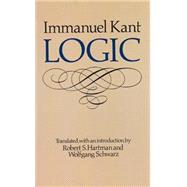
Buy New
Rent Book
Rent Digital
Used Book
We're Sorry
Sold Out
How Marketplace Works:
- This item is offered by an independent seller and not shipped from our warehouse
- Item details like edition and cover design may differ from our description; see seller's comments before ordering.
- Sellers much confirm and ship within two business days; otherwise, the order will be cancelled and refunded.
- Marketplace purchases cannot be returned to eCampus.com. Contact the seller directly for inquiries; if no response within two days, contact customer service.
- Additional shipping costs apply to Marketplace purchases. Review shipping costs at checkout.
Summary
Table of Contents
Abbreviations
Translators' Introduction
I. The Significance of Kant's Logic
II. Analysis and Synthesis in General Logic
III. Analysis and Synthesis in Transcendental Logic
Immanuel Kant's Logic
Dedication
Preface by Gottlob Benjamin Jäsche
Introduction
I. The Concept of Logic
II. Main Divisions of Logic
Different Ways of Its Presentation
Usefulness of This Science
Outline of Its History
III. Concept of Philosophy in General
Philosophy According to the School of Concept and According to the World Concept
Essential Requirements and Goals of Philosophizing
The Most General and Highest Tasks of This Science
IV. Short Outline of a History of Philosophy
V. Cognition in General
Intuitive and Discursive Cognition; Intuition and Concept and Their Difference in Particular
Logical and Aesthetic Perfection of Cognition
VI. Specific Logical Perfections of Cognition
A) Logical Perfection of Cognition as to Quantity
Magnitude
Extensive and Intensive Magnitude
Range and Thoroughness or Importance and Fruitfulness of Cognition
Determination of the Horizon of Our Cognitions
VII. B) Logical Perfection of Cognition as to Relation
Truth
Material and Formal or Logical Truth
Criteria of Logical Truth
Falsity and Error
Semblance as the Source of Error
Means of Avoiding Errors
VIII. C) Logical Perfection of Cognition as to Quality
Clarity
Concept of a Characteristic as Such
Different Kinds of Characteristics
Determination of the Logical Essence of a Thing
"Distinctness, a Higher Degree of Clarity"
Aesthetic and Logical Distinctness
Difference Between Analytic and Synthetic Distinctness
IX. D) Logical Perfection of Cognition as to Modality
Certainty
Concept of Holding Something to Be True
"Modes of Holding-to-Be-True: Opinion, Belief, Knowledge"
Conviction and Persuasion
Reservation and Deferment of Judgment
Preliminary Judgment
"Prejudice, Its Sources and Main Varieties"
X. Probability
Explanation of the Probable
Difference of Probability from Verisimilitude
Mathematical and Philosophical Probability
"Doubt, Subjective and Objective"
"Skeptical, Dogmatic, and Critical Manner of Thinking or Method of Philosophizing "
Hypotheses
Appendix: Of the Difference Between Theoretical and Practical Cognition
I. General Doctrine of Elements
First Section: Of Concepts
Second Section: Of Judgments
Third Section: Of Conclusions
II. General Doctrine of Method
I. "Development of Logical Perfection in Cognition by Definition, Exposition, and Description of Concepts"
II. Development of Perfection in Cognition Through Logical Division of Concepts
Index of Passages in Kant's Writings to which Reference is Made in the Notes
Index of Names
Index of Subjects
An electronic version of this book is available through VitalSource.
This book is viewable on PC, Mac, iPhone, iPad, iPod Touch, and most smartphones.
By purchasing, you will be able to view this book online, as well as download it, for the chosen number of days.
Digital License
You are licensing a digital product for a set duration. Durations are set forth in the product description, with "Lifetime" typically meaning five (5) years of online access and permanent download to a supported device. All licenses are non-transferable.
More details can be found here.
A downloadable version of this book is available through the eCampus Reader or compatible Adobe readers.
Applications are available on iOS, Android, PC, Mac, and Windows Mobile platforms.
Please view the compatibility matrix prior to purchase.
